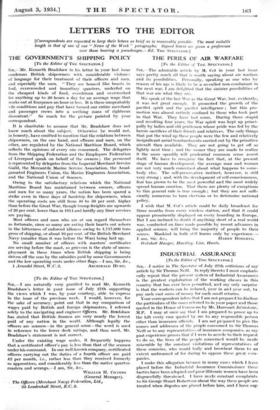THE PERILS OF AIR WARFARE
[To the Editor of THE SPECTATOR.] SIR,—The admirable article by M. Cot in your last issue says" pretty much all that is worth saying about air warfare and its possibilities. Personally, speaking as one who by reason of his age is likely to be a so-called non-combatant in the next war, I am delighted that the sinister possibilities of that war are what they arc.
We speak of the last War as the Great War, but, evidently, it was not great enough. It promoted the growth of the pacifist spirit and the pacifist intelligence ; but this pro- motion was almost entirely confined to those who took part in that War. They have had some. During those stupid and revolting four years, the War spirit was kept up princi- pally by ladies and old gentlemen whose pride was fed by the heroic sacrifices of their friends and relatives. The only things that put the wind up these people were the few and relatively insignificant aerial bombardments carried out by the primitive aircraft then available. They are not going to get off so lightly next time ; and the sooner they are made to realize it the more speedily will prudential common sense assert itself. We have to recognize the fact that, at the present stage of human development, the average man and woman are not very much concerned about what happens to some- body else. The self-preservative instinct, however, is still very strong ; and, with the development of self-consciousness, fear has grown to be the most powerful and the most widely spread human emotion. That there are plenty of exceptions to this general rule is true enough ; but they are not suffi- ciently numerous to turn elections or to determine national policy.
I wish that M. Cot's article could be daily broadcast for three months from every wireless station, and that it could appear prominently displayed on every hoarding in Europe. But I am inclined to doubt if anything short of a real world war, conducted on lines made possible by recent advances in applied science, will bring the majority of people to their senses. Mankind in bulk still learns only by experience.—






























 Previous page
Previous page